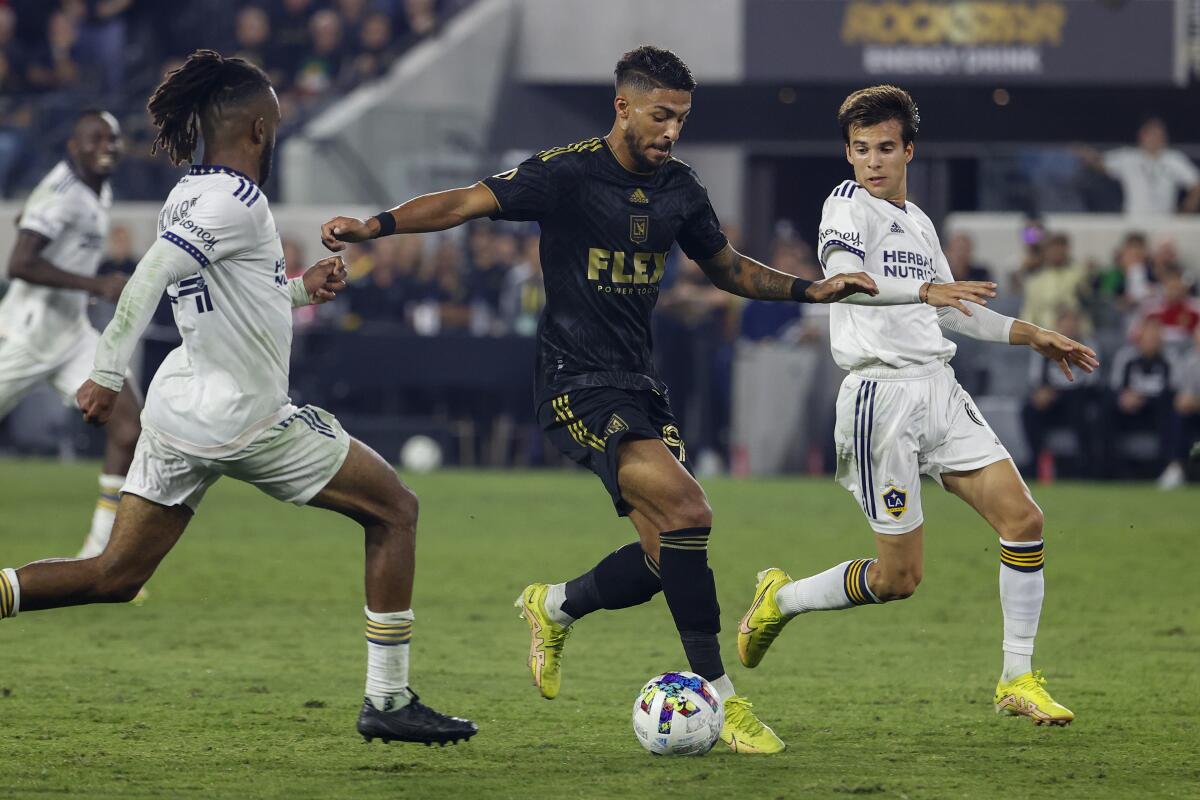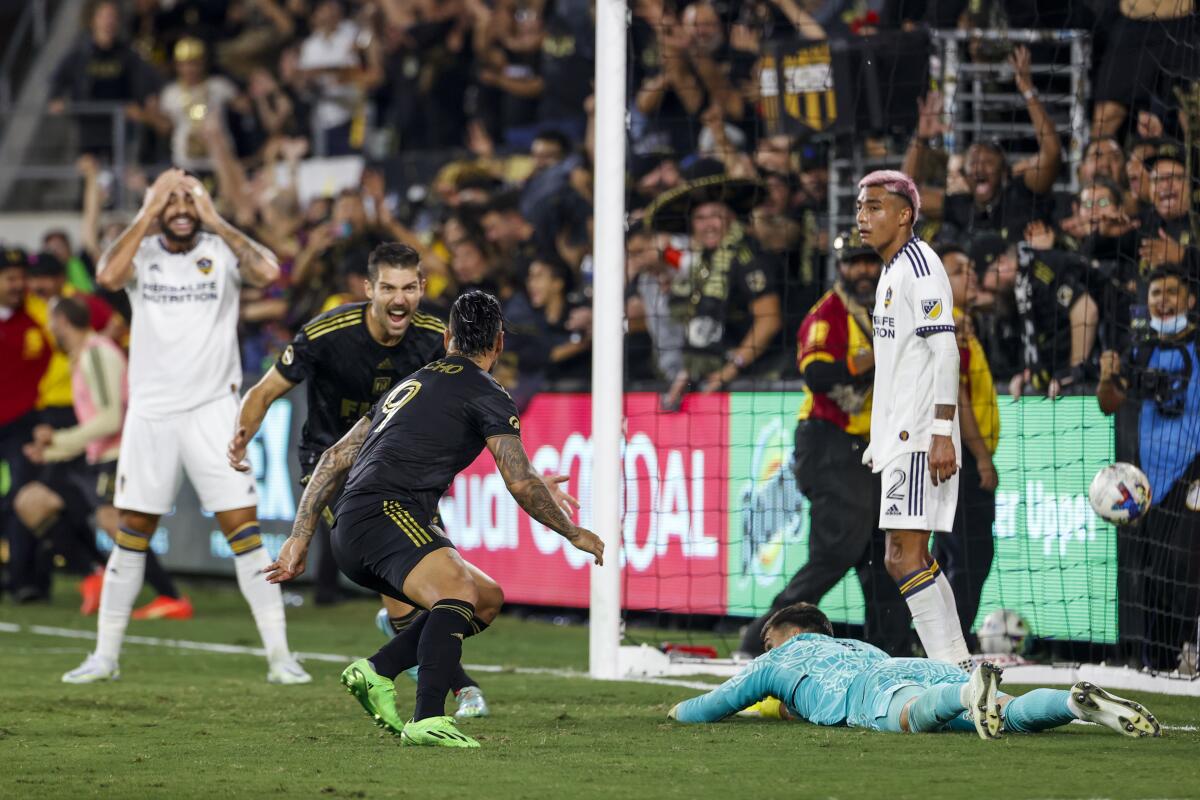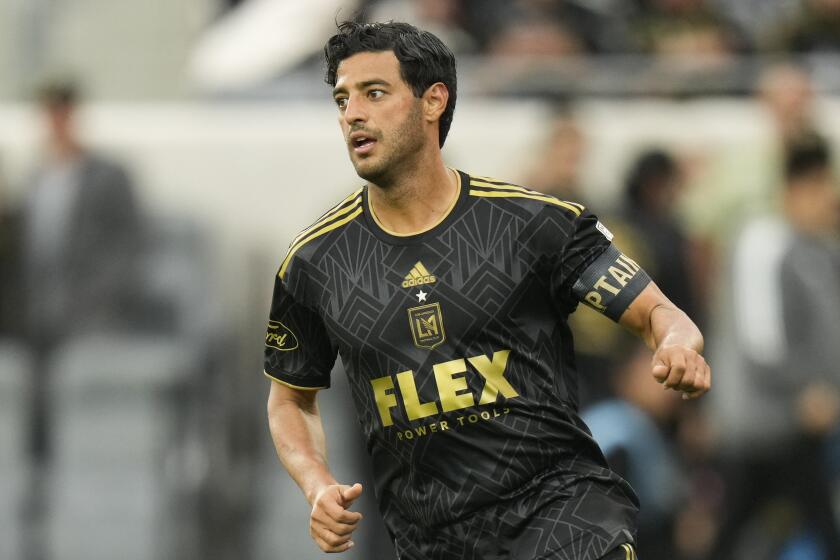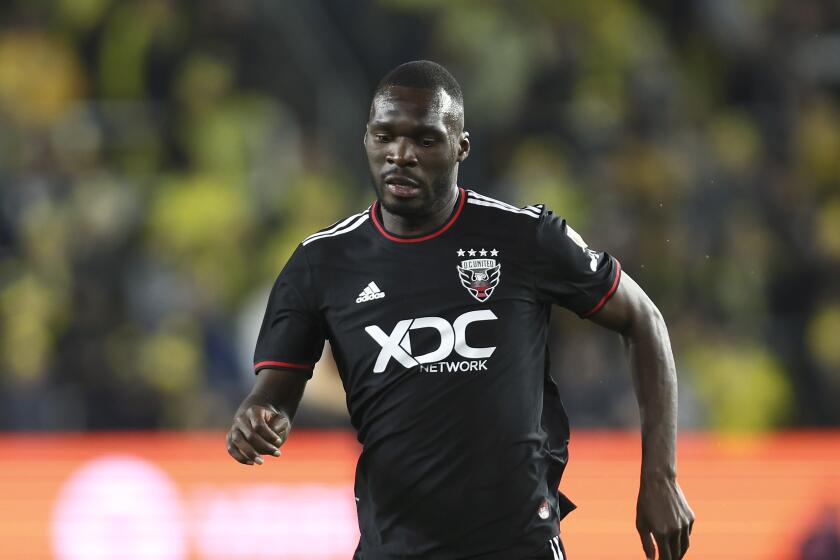LAFC-Galaxy hope rivalry’s luster shines when they meet again in U.S. Open Cup

- Share via
Kellyn Acosta was still on the practice field when U.S. Soccer held the random draw for the next round of Open Cup games. The LAFC midfielder wasn’t surprised when he learned who his team would play.
“We drew Galaxy?” he said. “Of course, we drew Galaxy. I don’t think that was random.” (Note to U.S. Soccer: Acosta was kidding, I think.)
The four-team regional draw had just a 16% chance of pitting the Galaxy against LAFC, just as it did last season. Yet just as it did last season, that’s exactly who LAFC drew. The neighborhood rivals, whose home stadiums are separated by less than 12 miles, played each other four times last year, including in the MLS playoffs. They will meet at least four times — and possibly eight, given the league’s expanded postseason format — this year.
That raises an interesting question: Can a rivalry truly remain a rivalry when the teams play each other so often?
Tuesday’s Open Cup game will mark the 19th edition of the El Tráfico derby since LAFC joined MLS in 2018. No two MLS teams have played each other that often during that span, which has arguably taken some of the edge off the series. How can you work up sufficient loathing for a rival when you play them every seven weeks?
“It’s a very delicate balancing act for the league and the teams. Each wants to continue to build or reinforce brand and increase revenue, but each has to be careful that the rivalry’s luster doesn’t wane,” said David Carter, a professor of sports business at the USC Marshall School of Business and founder of the Sports Business Group, a consulting firm. “In sports, events are more captivating than games, and special matchups far more so than games that have been commoditized.”
Carlos Vela scores on a penalty kick in stoppage time to propel LAFC to a 2-1 victory over the San Jose Earthquakes.
MLS is largely to blame. In three of the last six seasons, the league’s unbalanced schedule has forced some teams to play at least one conference opponent three times during the regular season. In the hopes of forging a rivalry, MLS has twice used that extra game for an additional Galaxy-LAFC matchup.
The teams have played each other in the postseason twice, and in 2020, when travel was hampered by the COVID pandemic, they faced off four times in 22 games. Tuesday’s match will mark the second time in as many years they have played in the U.S. Open Cup.
But that repetition might not be the only reason the bloom seems to have come off this rose. There’s also this: Since entering the league, LAFC leads MLS in points, wins and goals while the Galaxy, at 72-89-44, have the third-most losses in the Western Conference since coach Bruce Arena’s departure before the 2017 season.
“It’s routinely about the tradeoff between quality and quantity,” Carter said. “As the quantity of LAFC-Galaxy games increases, the need for a compelling hook increasingly exists. This can be that both teams are playing well — or at least playing for something — or that dynamic and intriguing stories connected to the players and their personal rivalries exist.
“I don’t think we’re at the point where familiarity breeds contempt. But just because you enjoy chocolate ice cream for dessert doesn’t necessarily mean you want it every night because it may begin to look and taste like Neapolitan.”
Tuesday’s match is an elimination game, but the U.S. Open Cup is arguably the third-most-important competition LAFC (a Western Conference-best 7-1-4 in MLS) is playing in this month, behind the CONCACAF Champions League final and the MLS regular season. In the team’s last Open Cup game, coach Steve Cherundolo rested his exhausted regulars and started eight teenagers — most of them off LAFC’s MLS Next Pro developmental team — but still won on penalty kicks over Monterey Bay FC, a second-year team in the USL Championship, a second-tier league.

For the Galaxy (2-8-3 and last in the MLS table), the Open Cup represents both their best shot at a trophy this season and an opportunity to gain some traction in an otherwise dismal season. That’s why coach Greg Vanney started a first-team lineup in his club’s first Open Cup game and was rewarded with the only three-goal performance of the season against a Seattle Sounders team made up mostly of reserves.
The desperate Vanney, whose team is winless with one goal in seven games on the road, is likely to stick with the same philosophy Tuesday.
“A win against LAFC can really kick-start something for us,” Galaxy goalkeeper Jonathan Bond said.
Meanwhile, Cherundolo, whose team will be playing for the fourth time in 11 days, probably will go back to a first-team lineup after holding many of his regulars out at the start of Saturday’s 2-1 win over San Jose. LAFC will have a weeklong break before the first leg of the CCL final in Léon, Mexico, and Tuesday’s rivalry game is not one the black and gold want to lose at home — especially since it hasn’t lost to an MLS opponent there in 11 games and more than seven months.
Christian Benteke had a goal and an assist two minutes apart in the second half to lift D.C. United to a 3-0 victory over the Galaxy on Saturday night.
The Galaxy won last spring’s Open Cup game with LAFC at Dignity Health Sports Park, but LAFC has won the last three meetings, scoring three goals each time. That’s the longest winning streak for either team in the series, another sign the luster of the rivalry is beginning to fade.
“We’re just trying to do our part to make sure it remains healthy, the rivalry,” Cherundolo said earlier this year. “[That] it remains of high quality and that it remains exciting for the fans.”
If the results remain as predictable as the U.S. Open Cup draw, it’s hard to see how that happens.
⚽ You have read the latest installment of On Soccer with Kevin Baxter. The weekly column takes you behind the scenes and shines a spotlight on unique stories. Listen to Baxter on this week’s episode of the Corner of the Galaxy podcast.









